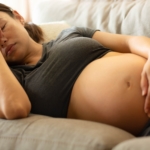Postpartum psychosis (PPP) is a rare but serious condition, occurring in 1 to 2 per 1000 women in the weeks after delivery and associated with extreme delirium-like behavior, delusions, hallucinations, and an increased risk of suicide and infanticide.[1] While there appears to be a strong link between postpartum psychosis and bipolar disorder,[2] it is estimated that about half of women who present with postpartum psychosis have no psychiatric history prior to delivery, making it difficult to identify in advance those women who are at greatest risk for this illness. While the last decade has brought increased awareness of the prevalence and need for treatment of postpartum depression, our knowledge regarding the ideal acute treatment, potential prophylactic interventions for PPP or etiology of this most severe form of postpartum mental illness, remains elusive.
While PPP is hypothesized to have a strong neurobiologic underpinning, to date, no clear genomic signature for postpartum psychosis has been identified. Given the need for more research in this area, we at the Ammon-Pinizzotto Center for Women’s Mental Health are proud to announce the establishment of the MGH Postpartum Psychosis Project (MGHP3). The specific aims of the study include better delineation of the phenomenology of postpartum psychosis, as well collection of samples of genetic material (saliva) from women who have experienced an episode of postpartum psychosis in the past ten years. We hope to provide insight into the psychological and genetic risk factors for this understudied condition to help women and their clinicians make better informed care decisions as they approach pregnancy and the postpartum period.
See here for more information on this study or how to participate.
References:
[1] https://www.ncbi.nlm.nih.gov/pmc/articles/PMC5491479/
[2] https://www.ncbi.nlm.nih.gov/pubmed/27609245








Leave A Comment